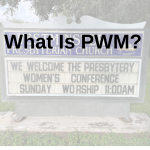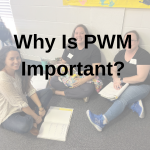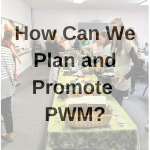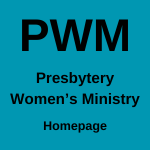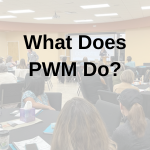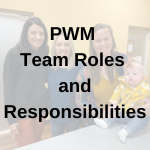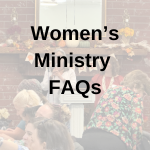Pro Tips for PWM Leaders
- Pray. As you are deciding who should fill positions, ask the Lord to show you who He might be calling to help with the work. Try to consider women of different ages and from various churches within the presbytery, if possible. After praying for wisdom and even seeking godly counsel from presbytery elders, invite women to join you in leadership. Ask them to pray about it before responding.
- Use written job descriptions, if possible, when asking someone to serve. Having expectations in writing and discussing them up front will avoid a lot of misunderstandings down the road..
- Show an interest in each person. Find out about her. People like to work with women who are interested in them. Let her know she is unique and would add to the ministry.
- Be enthusiastic. Even if you don’t know what you’re doing, you can be excited about what God is going to do!
- Always stress the importance of serving the Body of Christ. Strengths and weaknesses aside, God uses the available. Love for people is the most important ingredient.
- Always present leadership as a privilege, not a duty. Let them know we are serving God, not people; it’s His ministry.
- Don’t lower the expectations of the particular ministry by saying, “You don’t have to do much.” People are looking for and need meaningful and valuable ways to use their time, and challenging ministries will encourage them to serve.
- Realize that you can’t please everybody all the time. Criticism will come. But do what the Lord would have you do. If you sincerely and prayerfully do your job as unto the Lord, usually it will work out.
- Recognizing that we all have strengths and weaknesses, don’t be drawn into criticizing others who have done a job in the past. A critical attitude will keep people from serving because they will know you will criticize them if they don’t please you.
- Don’t try to rob the Holy Spirit of His ministry. You can’t do that anyway. Let other people create, change, imagine. Be flexible and open minded with other’s ideas.
- Involve as many people as possible in a ministry. Give every woman or someone from every church something to do. It will give ownership of the ministry, as involvement breeds commitment.
- Recognize we all work on different cylinders. Some are able to go a mile a minute—others run at a slower pace. Be sure your expectations take into account and allow for people to flourish no matter what their individual style of serving.
If you are fortunate enough to have a diverse team, there will always be conflicting ideas, but that is not a bad thing in and of itself. Working through conflict well builds a strong team. Don’t forget you have support in the national team. Reach out to your RA if you need help.
After interviewing four pastors from two different Presbyteries, the following list of important elements for a Presbytery Women’s Ministry report at Presbytery was developed:
- Brevity—the report should be no longer than 5-7 minutes (that means practice it aloud several times in advance; it should be no longer than 3-5 minutes when you are saying it ahead of time!).
- Use some type of visual aids—Don’t just talk; you need to be holding up something that reinforces what you are saying. For example: If you want to push a retreat, give them a mint with a little 2”x2” note attached giving them the title of the retreat and the dates. Ask your supervising elder what might be most useful, and consider forwarding information through him to the Clerk of the Presbytery, who can share the information with every member.
- Be enthusiastic! Pastors don’t need a lot of details (the date your meeting was held, how many women attended, what you served for lunch, what favors you gave), but they are more likely to remember what you say if you are enthusiastic.
- Is there an action item for them? Be sure to stress that in your closing. Be sure to thank them for their support and give specific examples of how the presbytery has benefited the Presbytery Women’s Ministry. (Maybe it’s your trip to the Leadership Training.)
- Follow up your talk with a letter to the Clerk of Session of each church (rather than, or in addition to, one being addressed to the pastor). It is the Clerk’s responsibility to bring items before Session; otherwise, the information may or may not get passed on. Often Pastors receive so many pieces of paper at Presbytery that they tend to get filed away.
- Hopefully you have an opportunity to meet with the CE Committee prior to the Presbytery meeting. You should be well prepared! Be sure to update them on your budget needs and expenses. Keep good records.
Have several people praying for you as you prepare for and as you make your presentation.
My purpose is that they may be encouraged in heart and united in love,
so that they may have the full riches of complete understanding,
in order that they may know the mystery of God, namely,
Christ, in whom are hidden all the treasures of wisdom and knowledge. — Colossians 2:2–3
Devote yourselves to prayer, being watchful and thankful. — Colossians 4:2
Have an objective
- Spend much time in prayer with your leadership team to seek God’s purpose for your event/ministry.
- Consider the Women’s Ministry vision, philosophy, strategy (helper design, community/ compassion, Titus 2, accent areas) in determining your objective.
- Utilize local Women’s Ministry leaders in determining objective. They know local situations, so they should be involved in your planning. Also, they must own it to promote it. This presupposes developing relationships with these women.
Questions to ask as you plan event/ministry
- Will the program be consistent with our PCA theological distinctives?
- Are there presbytery issues/concerns/projects that they would like incorporated into the program? This presupposes communication with presbytery leadership.
- Will it challenge women in their personal relationship with the Lord?
- Will it cultivate community among the women who participate?
- Will it reflect the common union in Christ and an appreciation for the diversity of cultures, gifts, and experiences of the women in attendance?
- Will it equip women to develop stronger women’s ministries in the local church?
- Will women have a greater sense of being a part of your presbytery and of the PCA?
- Will women leave knowing specific ways to pray for one another, for the presbytery and for the denomination?
Planning ideas
- Involve as many churches as possible in planning and implementing the program by delegating responsibilities for things such as name tags, table decorations, special music, door prizes, refreshments, skit, etc.
- Always have greeters. It is essential that women feel welcome from the time they enter the front door. Place hostesses strategically at additional locations.
- Plan creative ways for women to meet women from other churches (small prayer groups, table assignments for lunch, etc.). This can be done with number or color on name tag, everyone with June birthdays, etc. Another idea is to have “table topics” at lunch such as widowhood, parenting teens, women in the marketplace, pastors’ wives, ruling elders’ wives, mothers of mentally or physically challenged children, single mothers, etc. Have a facilitator at each table to guide the discussion and then prayer time.
- Be conscious of cultural considerations when developing ice breakers, music selections, and terminology. Never assume familiarity.
- Think through dates, locations (accessibility for persons with disabilities), child care options, options for nursing mothers, start/end times for families/work schedules, and transportation for seniors, persons with disabilities, or others without a personal vehicle. (This does not mean these are all things the WM needs to provide but thoughtful understanding and clear communication of what is and what is not provided and what is the responsibility of the attendee.)
Have a realistic program plan
- Be sure everyone on the program knows exactly how much time they have. Have a timekeeper if necessary.
- Be sure song leaders, testimonies, etc. are prepared. The Box Talk is a great, brief addition to many programs.
- Think through where everyone on the program will sit. Do not waste time waiting for someone to come from the back of the room.
Speakers
- You do not always need a speaker. Panels, testimonies, ministry opportunities, prayer groups, “Women’s Ministry Stories” (have each local Women’s Ministries give creative presentations to tell about programs, ministries, etc.) may be a better way to accomplish your objective.
- If you have a speaker, be sure she can help you accomplish your objective. We encourage you to have someone who is involved in the women’s ministry unless there is a good reason to go outside.
- Be sure the speaker knows your objective, how many times you want her to speak and exactly how much time she has—then be sure this does not change after she arrives.
- Regardless if there is a speaker or various women from the ministry are presenting, help shepherd their awareness and consciousness of the attendees, specifically examples or illustrations that consider youth, young adults, culture, and being new to the PCA. Remind them not to assume that everyone will be familiar with “lingo”.
- Talk with your presbytery CE chairman to find out if you should submit your objective and the name of the speaker you want to invite for presbytery approval. Even if this is not necessary, it is important to maintain close communication by submitting your plans to him.
Invitations
- Appoint one person for communication with prospective speakers.
- Communication may be in writing, by phone, or by e-mail. After an initial introduction on the phone, it may be best to use email for easy reference about past decisions and communication.
- Communication should clearly indicate if this is an invitation or exploration of several speakers.
- Be certain that your designated elders are given opportunity for oversight of speaker and topic for local church and presbytery events. Consider the speaker’s theological viewpoint. Give elders opportunity to watch recordings, call the speaker and/or interview her.
- Discuss the goals of the event; topic of messages, number of messages. Communicate these goals to the speaker.
- Inform speaker regarding the women who usually attend—number, average age/stage in life or the fact that it will be a wide rage, if there will be youth/teens/college students, cultural make-up, and your general goals; who spoke at the last event and what was the topic; what studies and activities have been done in the last year.
- Agree with prospective speaker what next step will be after first contact—are you to call her to confirm date and topic, is she holding a date for your elders’ and committee approval, etc.
- Discuss travel arrangements—if airfare is involved you may want to get an idea regarding the fares prior to calling speakers. Will speaker make her own travel plans? If so, be sure she is aware of method for prompt reimbursement of airfare. Is there a limit to the airfare or travel expenses which your group can reimburse? If so, communicate this to speaker.
- Carefully confirm date, topic and other agreements in writing. It is helpful to send an agenda or retreat booklet used in the past.
Honoraria or Fees
- Consider with event committee and elder what is a reasonable honorarium for the commitment. (Perhaps look at what other fees are paid to guest speakers. Note: It is not uncommon for a speaker to have $1,500 as a fee.)
- Some things to remember when setting an honorarium: time requested (messages, one-to-one appointments, small groups, etc.) preparation time; travel time; arrangements at home (child care, meals for family, laundry bills, etc.)
- Speakers are very appreciative of gifts and special mementos but these should not replace an honorarium unless speaker has refused honorarium.
- At first contact, ask speaker if she has a set fee. If you cannot afford this fee discuss this with her.
Scheduling and Agenda
- Have one person responsible for all communication with the speaker. It can be very confusing and time consuming to have multiple people contacting her with comments and questions.
- Decide with event committee and elder what topics are appropriate—communicate clearly to the speaker what topics are of interest to your group.
- Decide the number of messages and the exact time to be allowed for speaking—communicate this to the speaker at the first contact. Do not deviate from the schedule given to the speaker since she will have prepared for that amount of time.
- At initial contact tell speaker of any other persons on the agenda (preferably arrange for contact between speakers, musicians, those who will give testimonies).
- Send speaker all event publicity and handouts.
Hospitality
- Assign one or two women to assist the speaker. Give her their names and room numbers so she can contact them during the event.
- Arrange for transportation from airport, or send directions for driving. Communicate with speaker during 7–10 days prior to event regarding who will meet her, address and phone number for where she will be staying, etc. Ask her if she has any special dietary or sleeping needs.
- Consider the time that your speaker has spent getting to your location and possible fatigue factors, time zone changes, meals, etc. Ask her what her physical needs are.
- Gifts, fruit, notes of encouragement all help the speaker to feel welcome.
- Check with speaker regarding sound systems, podiums, room arrangement, water at podium. Does she permit taping?
- If speaker is to be staying in the room with women whom she does not know, prepare them for showing her hospitality and privacy. Always offer the speaker the option of a room to herself.
- Be mindful of attire of greeters. There can be unintended consequences of assumed familiarity. Things like flags, hats, badges, should be well thought out with awareness about the attendees before including.
Prayer
- The most helpful part of speaker etiquette is prayer!
- Ask speaker for prayer requests.
- Assign specific prayer partners and times—write her notes to let her know of prayer prior to event.
- Have prayer partners pray with speaker prior to and during the event.
What hinders creativity?
- Not asking God, the Creator, for ideas and help.
- Stereotyping—expecting women to react the same way always. Being in a rut.
- Setting wrong priorities. Not knowing the needs of women. No goals or purpose. Not asking the questions: “Why are we doing this?” and “Is there a better way?”
- Not willing to take risks. Sometimes we may fail in an attempt to be creative, but it’s worth the risk. Forcing women to get out of their comfort zone is risky, but often necessary. Too often we listen to those who say, “We’ve never done it this way before.” Your reply should be, “Good, that was our intention!” Creativity sometimes means not doing the same thing in the same way.
Some creative ways for women to connect:
- Name tag matches the table where they sit.
- Find a common denominator: a season of life, birthday months, family status (married, single, widowed, etc.) hobbies, etc.
- Go around the group and have each woman tell about something they have done that they believe no one else in the group has done.
- Neighbor nudging (pray with person next to you, give each other an idea of successful meeting/party/game, share your favorite inexpensive place to eat, tell about a good book you’ve recently read).
- Give out slips of paper with questions on them, one for each person, and have them answer the question to the group.
- Share with the whole group or table a bit of information about a person that you just met.
- During your meeting have small groups of women discuss particular parts of the topic.
- Creatively match women to pray for one another.
- Give prizes to those who remembered and prayed for prayer partner, or those who brought a guest or the driver of a car pool, or the one who came the farthest, etc. Women do love door prizes.
Use Creative Titles
Instead of meetings, call them something else. People don’t like “meetings.” They are more likely to come to a party, or a tea, or a coffee, or a dessert or a get together. The programs can be the same, only the name is changed.
- Play-plan-pray party: You do just what it says
- Get acquainted time: Have each woman tell about what is going on in her life. This often reveals much to laugh about, cry about, pray about.
- Connect-a-thon: How to connect with husbands, children, neighbors, co-workers, church people. Sounds better than a parenting seminar.
- Show and Tell: Have women bring an object which represents something about them or something important to them and talk about it.
- Prayer Walk: Don’t sit in chairs for a prayer meeting, instead walk around the church. As you go into each room pray for: pastor, nursery workers, and children, Sunday school workers and kids, parking lot and visitors, kitchen for God’s provision, bathroom for cleansing confession, etc.
- Bookend Bash: Each woman brings a book she will lend and tell why and how it affected her life. (Be sure to keep records of who borrowed each book)
- A Covenantal Approach to Women’s Ministry
- Pick-A-Party: Have a selection of different get-togethers during the month for the women to choose (one or more). These are at different times to accommodate the different schedules women have from bowling, cooking class, craft evening, evening dessert, Saturday brunch, afternoon tea, morning coffee, book discussion, etc.
- Summer Salad Supper: Each woman brings a favorite salad recipe.
- Helps and hindrances for Homeowners (or Housewives or Parents, etc.). These are practical tips on managing money, warning of scams (especially for older people) tips on local bargains, etc. Part of the Titus 2 charge to manage the home.
- Cookie Exchange: Bring a batch of Christmas cookies and an empty container. Go home with a selection of every cookie.
- Other titles: Spring Fling, First Tuesday Lunch Bunch, Fall Kick-off Festival, Rally, Ice Cream Social, Panel Discussion, Celebration, Sisters Serving, Fellowship, Retreat, a Happening, etc.
Tips for Leadership on Creative Meetings
- You will be more inclined to be creative about what’s important to you. Find out who has a heart for the project and have her lead the team.
- It is easier to be creative in the areas that God has gifted or equipped you.
- Walking in the Holy Spirit frees us to be creative. Pray for creativity.
- Get the routines done so you can be free to be creative. Last minute rushing stifles creativity.
- Getting burned out? Think others don’t do it as well? Take an attitude check. Allow others to do it.
- Consider the characteristics of a successful event. See how they do it. Follow their example. Start on time, have good food, fellowship accommodations, creativity. Strive for excellence in all details.
- Don’t be afraid to let a ministry die—or kill it! Often this is better.
- Always brainstorm. Let every idea be considered—nothing is too outrageous to be put on the blackboard. One person’s crazy idea often leads to other ideas that are really good.
- Get on the church mailing lists for their Women’s Ministry newsletters. Many of these are now electronic, so there is no added cost for the church. You’ll get lots of ideas. Make calls to other Women’s Ministry groups and ask them what they do for particular events.
- Attend Presbytery Women’s Ministry meetings and ask the Presbytery Women’s Ministry Team to include church event ideas as part of the program.
- If you have a particular problem in your Women’s Ministry, throw it out to the team for discussion and let others discuss solutions (these are not to be personality problems, but logistical, programs, etc.) Often solutions become concepts for wonderful programs.
- Make some commitments:
- Be culturally relevant. Make sure you are dealing with issues that will help women deal with the culture they live in every day.
- Not to do it the same way all the time but to have variety.
- Meet needs, making sure the time spent is worthwhile for those attending.
- Not to do it alone, but work as a team, having each group do something involving more people and having them own it.
- Know your women. Be creative. Some groups enjoy skits, songs, poems, cartoons, etc. Others need just the facts. Do what communicates.
- Allow failure. Attempting and failing is so much better than never trying anything new. Proverbs 24:16 says, “A faithful man falls seven times and rises again.”
What are some ideas for recruiting women in my presbytery to attend LT?
- Always be mindful of the early and final deadlines.
- PWM leadership should send an email to their contacts for each church with the info about LT. Invite, invite, invite!
- Use the video made in 2016 for anyone who doesn’t understand what LT is.
- Start with the Women’s Ministry leadership team and all women’s Bible study leaders.
- Consider women in other leading roles. Ask a few key people in your church who they might recommend. Invite women who regularly mentor or disciple others, TE and RE wives, other ministries—music, Christian education, missions, etc. or any woman just needing the encouragement of fellowship with sisters in Christ. There may be opportunities down the road for direct WM roles.
- Reach out to PCA contacts you have through social media sources. Sharing the video, above, can be an easy way to do this.
- PWM leadership can request time at Presbytery meetings to share about LT and encourage pastors to send women in leadership from their churches and for the churches to help with the expenses. Emphasize how this will help the local church.
- If the Presbytery Women’s Ministry has meetings, announce LT and have women who have gone before share what they received from it.
What are some ways to pay for getting to LT?
- If possible, register before the early deadline for the best price.
- If church can afford, put line item into your Women’s Ministry budget to send one or two ladies each year, or at least to scholarship partially.
- Presbytery Women’s Ministry can sometimes provide a line item in their budget to help pay the cost of LT for one or two ladies. You might consider asking the Christian Education Committee of presbytery if they would budget money to send two representatives from the Presbytery Women’s Ministry Team.
- If you are within driving distance, look for ways to match ladies in the presbytery for carpooling to split the cost.
- Multiple local churches share costs of bus or van charter.
- Request use of year end funds that will be unspent from ministry areas outside of WM. (One RA tries each year to use unspent funds from a mentoring ministry to offer all or part of registration for one of the mentors in that ministry)
- On flip side, if the women you invite are part of other ministry areas, request to share costs between ministries.
- Some churches have held fund raisers, or asked women to contribute to a scholarship fund to help send representatives.
- There are some scholarships available through CDM and you can apply for one by contacting Kathy Wargo (kwargo@pcanet.org).


